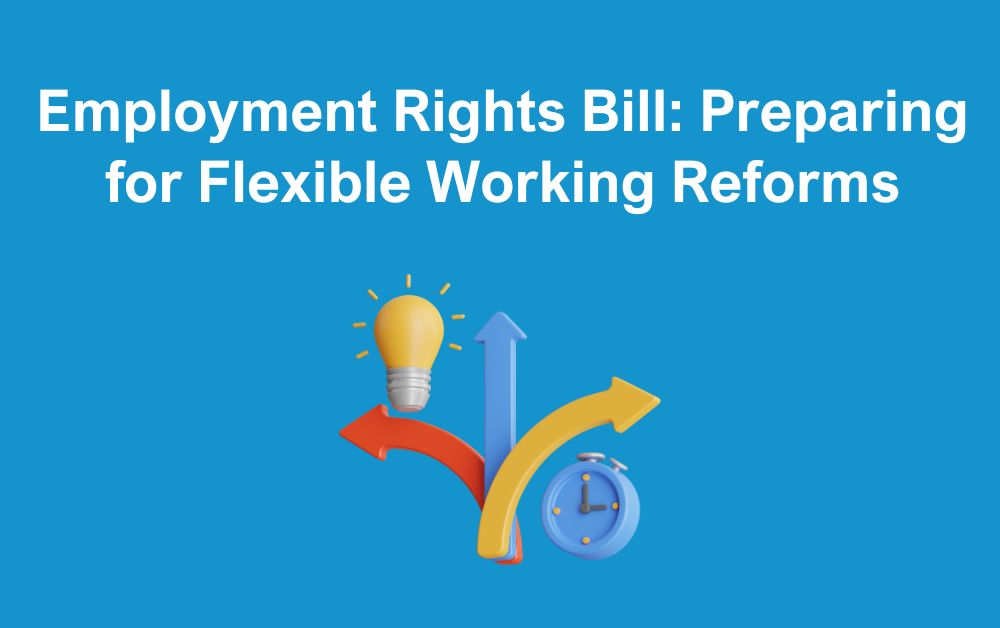The UK Employment Rights Bill, with its latest flexible working request reforms, is set to transform the workplace landscape. This legislation focuses on making flexible working a default right, rather than a privilege. This marks a significant shift for both employers and employees. Here’s a breakdown of what these changes mean for employers and how they can prepare for the new norms.
Current Legislation on Flexible Working
Under the current law, any employee has the right to make a flexible working request as a day one right. This means that employees can make an enquiry as soon as they start a job. The request can include adjustments to working hours, location, or other arrangements such as job sharing or compressed hours. Employees are able to make two requests a year. However, they can only make one live flexible working request at a time.
Employers, however, are not legally bound to accept this. Although, they are required to consider the enquiry and respond within two months. In this time, you must consider the request, consult with your staff member, and let them know the final decision.
If the final outcome is to reject the request, you must hold a consultation with your employee. This is a good opportunity to discuss the reasons why the flexible working request is not possible at that time. You will also be able to come to a better understanding with your employee.
The Employment Rights Bill: Proposed Changes
The Employment Rights Bill aims to reshape flexible working legislation to create a more inclusive and adaptable workforce, recognising that the demand for flexibility has surged, particularly since the pandemic.
The Government’s plan to make “flexible working the default where practical” marks a significant shift in employment rights. This indicates a proactive stance towards this style of working. Under this approach, flexible working would become the norm rather than the exception. The onus will then be placed on employers to justify why it would not work for their specific business needs.
What Does “Flexible Working as the Default” Mean?
Making flexible working the default means that all roles should be open to flexible arrangements. This is whether it’s remote working, part-time hours, compressed workweeks, or job-sharing—unless the employer can present a legitimate business reason otherwise. This shift would reshape the standard employment contract, building flexibility into roles from the outset and giving employees more choice in how and where they work.
Currently, employees have the right to make a flexible working request, but it’s not guaranteed. With this change, employees wouldn’t just have a right to ask; they’d be entitled to flexible arrangements unless the business can demonstrate why it wouldn’t work. This could involve challenges like operational needs, customer service demands, or specific logistical concerns. However, employers would have to clearly outline these reasons. Therefore, meaning that any decision against flexible working would need to be carefully documented and backed by concrete business rationale.
Business Secretary Jonathan Reynolds said:
”The best employers know that employees are more productive when they are happy at work. That is why it’s vital to give employers the flexibility they need to grow whilst ending unscrupulous and unfair practices.
This upgrade to our laws will ensure they are fit for modern life, raise living standards and provide opportunity and security for businesses, workers and communities across the country.”
Jane van Zyl, CEO at Working Families, said:
”Establishing workplace rights from day one and making flexible working the default could be the key to unlocking labour market mobility, with the promise of getting the economy moving and ensuring parents and carers are not held back in their careers.”
Challenges and Opportunities
While these changes are designed to make flexible working more accessible, they also bring several implications for employers, who will need to navigate the following challenges and opportunities.
1. Increased Administration
With the increased number of flexible working requests and shorter response time, employers may find themselves dealing with more administrative tasks. HR teams will need to process enquiries efficiently, consider the implications on team dynamics and productivity, and manage potential conflicts between employees who prefer different work arrangements.
Solution: Employers should consider investing in technology or software that can streamline the process of handling requests, potentially automating some of the administrative tasks involved.
2. Workplace Culture and Employee Engagement
Flexible working reforms may positively impact workplace culture by making the environment more inclusive and accommodating. However, employers will also need to consider the potential impact on team collaboration and communication, particularly in hybrid or remote arrangements.
Solution: Foster a culture that prioritises communication and inclusivity, regardless of employees’ work locations. Regular team meetings, both in-person and virtual, and collaborative tools can help maintain team cohesion.
3. Handling Declined Requests
While the reforms aim to give employees more control, there may be legitimate business reasons for refusing certain requests. In these cases, employers need to communicate clearly and empathetically, providing a rationale for the decision to avoid demotivation or misunderstandings.
Solution: Establish a structured framework for assessing and responding to flexible working requests that include a list of acceptable business reasons for refusal. This will help employers make fair, consistent decisions.
Strategic Benefits of Flexible Working for Employers
Although these reforms present some logistical challenges, they also offer strategic advantages for employers.
- Attracting Top Talent: Offering flexible working as a default option is increasingly attractive to candidates, especially as work-life balance becomes a priority for many in the workforce.
- Employee Retention: Organisations that accommodate flexible working often see improved retention rates, as employees who have control over their schedules are more likely to stay long-term.
- Increased Productivity: Many studies have shown that flexible working can lead to improved productivity, with employees feeling more motivated and less stressed when they have more control over their work arrangements.
Practical Steps for Employers to Prepare
To Prepare for the Employment Rights Bill and make flexible working a seamless part of your culture, you should consider the following steps:
- Review and Update Policies: Examine current flexible working policies and adapt them to reflect the new rights. Ensure all employees are aware of these changes and how they can make flexible working requests.
- Training for Managers: Equip managers with the skills to handle flexible working requests effectively, focusing on maintaining team productivity and morale.
- Invest in Technology: Tools that facilitate collaboration and productivity for remote and hybrid teams are essential. Invest in platforms that allow for easy communication and project management across different work settings.
- Create a Communication Strategy: Transparent communication is vital. Develop clear guidelines for how flexible working will be managed, and encourage open discussions to address any questions or concerns employees might have.
Looking Ahead: Embracing Flexibility as the New Norm
The Employment Rights Bill signals the growing importance of flexible working in the modern workplace. For employers, these reforms are an opportunity to align with evolving employee expectations, ultimately creating a more resilient and adaptable workforce. By preparing now and adopting best practices for managing flexible arrangements, organisations can turn potential challenges into competitive advantages, making flexibility a core aspect of their employer brand.
In summary, the flexible working reforms brought by the Employment Rights Bill present a new era in employee rights. With the right strategies in place, employers can not only meet the legal requirements but also foster a more engaged, productive, and loyal workforce. If you would like support with a flexible working request, contact our HR experts.







